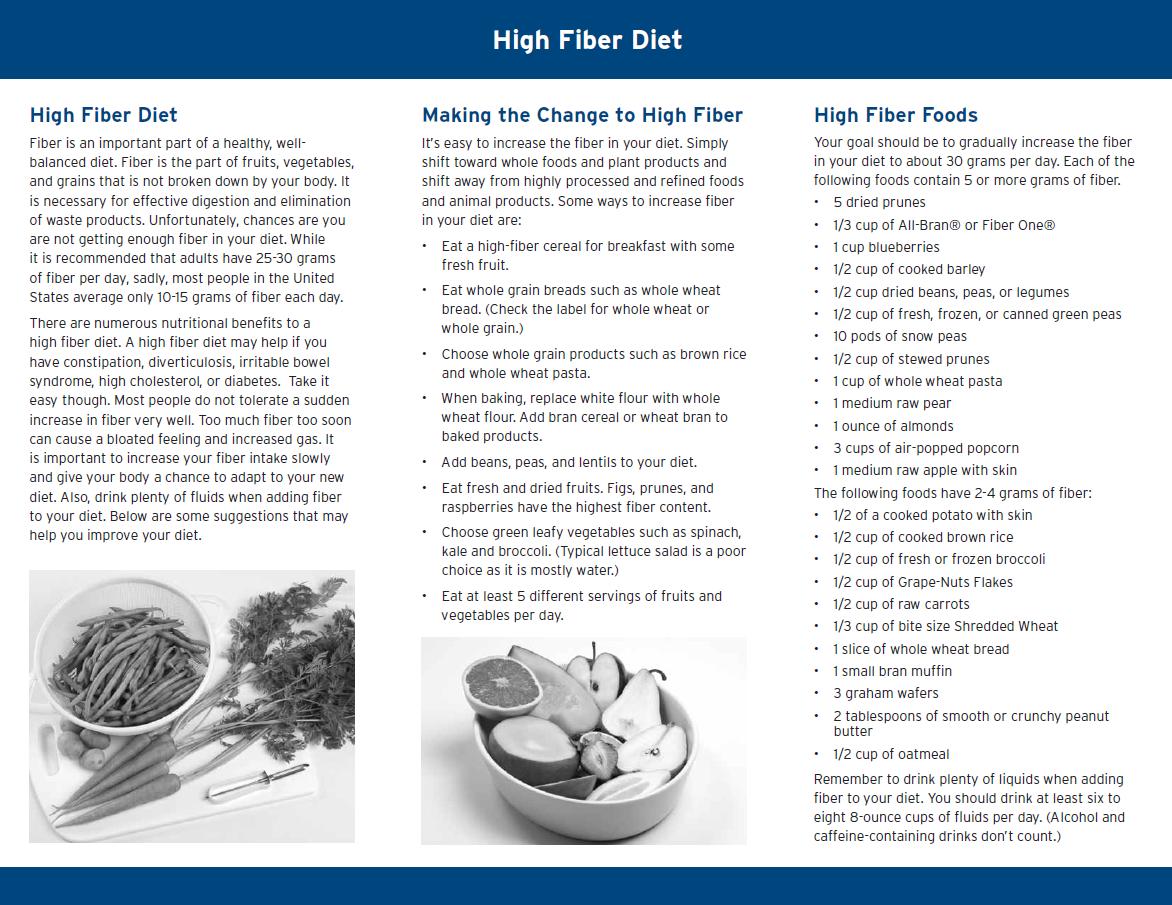Fiber is an important part of a healthy, well-balanced diet. Fiber is the part of fruits, vegetables, and grains that is not broken down by your body. It is necessary for effective digestion and elimination of waste products. Unfortunately, chances are you are not getting enough fiber in your diet. While it is recommended that adults have 25-30 grams of fiber per day, sadly, most people in the United States average only 10-15 grams of fiber each day.
There are numerous nutritional benefits to a high fiber diet. A high fiber diet may help if you have constipation, diverticulosis, irritable bowel syndrome, high cholesterol, or diabetes. Take it easy though. Most people do not tolerate a sudden increase in fiber very well. Too much fiber too soon can cause a bloated feeling and increased gas. It is important to increase your fiber intake slowly and give your body a chance to adapt to your new diet. Also, drink plenty of fluids when adding fiber to your diet. Below are some suggestions that may help you improve your diet.
Making the Change to High Fiber
It’s easy to increase the fiber in your diet. Simply shift toward whole foods and plant products and shift away from highly processed and refined foods and animal products. Some ways to increase fiber in your diet are:
- Eat a high-fiber cereal for breakfast with some fresh fruit.
- Eat whole grain breads such as whole wheat bread. (Check the label for whole wheat or whole grain.)
- Choose whole grain products such as brown rice and whole wheat pasta.
- When baking, replace white flour with whole wheat flour. Add bran cereal or wheat bran to baked products.
- Add beans, peas, and lentils to your diet.
- Eat fresh and dried fruits. Figs, prunes, and raspberries have the highest fiber content.
- Choose green leafy vegetables such as spinach, kale and broccoli. (Typical lettuce salad is a poor choice as it is mostly water.)
- Eat at least 5 different servings of fruits and vegetables per day.
High Fiber Foods
Your goal should be to gradually increase the fiber in your diet to about 30 grams per day. Each of the following foods contain 5 or more grams of fiber.
- 5 dried prunes
- 1/3 cup of All-Bran® or Fiber One®
- 1 cup blueberries
- 1/2 cup of cooked barley
- 1/2 cup dried beans, peas, or legumes
- 1/2 cup of fresh, frozen, or canned green peas
- 10 pods of snow peas
- 1/2 cup of stewed prunes
- 1 cup of whole wheat pasta
- 1 medium raw pear
- 1 ounce of almonds
- 3 cups of air-popped popcorn
- 1 medium raw apple with skin
The following foods have 2-4 grams of fiber:
- 1/2 of a cooked potato with skin
- 1/2 cup of cooked brown rice
- 1/2 cup of fresh or frozen broccoli
- 1/2 cup of Grape-Nuts Flakes
- 1/2 cup of raw carrots
- 1/3 cup of bite size Shredded Wheat
- 1 slice of whole wheat bread
- 1 small bran muffin
- 3 graham wafers
- 2 tablespoons of smooth or crunchy peanut butter
- 1/2 cup of oatmeal
Remember to drink plenty of liquids when adding fiber to your diet. You should drink at least six to eight 8-ounce cups of fluids per day. (Alcohol and caffeine-containing drinks don’t count.)
Fiber Supplements
If you find it difficult to get enough fiber by improving your diet, you may wish to consider adding a daily fiber supplement. Fiber supplements contain plant fiber that helps normalize bowel function by providing the bulk necessary to regulate both constipation and diarrhea. These supplements are available over the counter. Keep in mind to always take them with plenty of fluids, as directed.
Summary
Fiber rich foods are an important part of a healthy, balanced diet. Adopting a high fiber diet is one of the simplest things you can do to improve your overall health. When adding high fiber foods to your diet, do so gradually. Always remember to drink plenty of fluids when you increase fiber in your diet.

